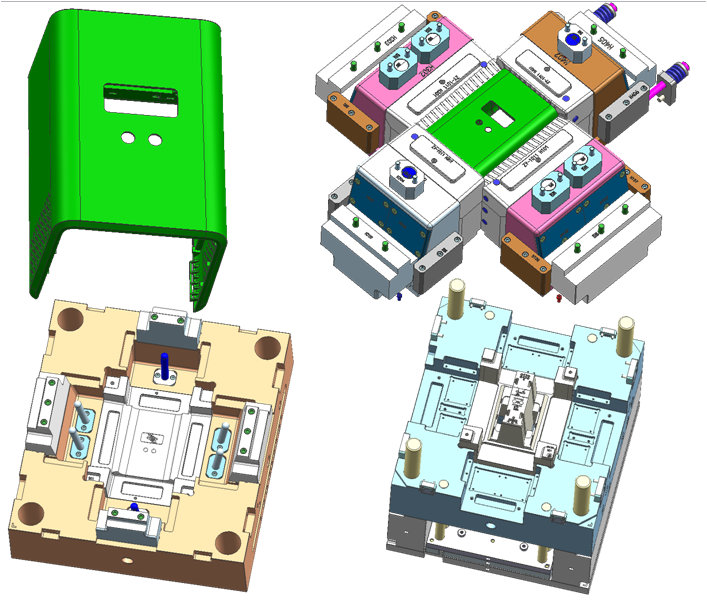
Release time:2023-05-16
Plastic internal stress refers to a kind of internal stress produced by the plastic shell during the melting process due to the orientation of macromolecular chains, cooling shrinkage and other factors.
The essence of internal stress is the unbalanced conformation of macromolecular chain formed in the melting process. After cooling and curing, this unbalanced conformation cannot immediately return to the equilibrium conformation suitable for environmental conditions. The essence of this unbalanced conformation is a reversible high elastic deformation, and the frozen high elastic deformation is usually stored in plastic shell products in the form of potential energy. Under appropriate conditions, This forced unstable conformation will be transformed into a comfortable stable conformation, and the potential energy will be converted into kinetic energy and released.
When the force and entanglement force between macromolecular chains cannot bear this kinetic energy, the internal stress balance will be destroyed, and the plastic shell will produce stress cracking and warping deformation.
Plastic shellCauses of internal stress
1. Orientation internal stress
The orientation internal stress is the internal stress produced by the arrangement of macromolecular chains along the flow direction and the freezing of orientation conformation in the process of plastic melt flow filling and pressure maintaining feeding.
The detailed process of orientation stress is as follows: the melt near the channel wall cools fast, causing the viscosity of the outer melt to increase. From one point to another, the flow rate of the melt in the core layer of the cavity is much higher than that of the surface layer, causing shear stress between the inner layers of the melt and the orientation along the flow direction.
The thawing of the oriented macromolecular chain in the plastic shell also symbolizes the existence of unreleased reversible high elastic deformation, so the orientation stress is the internal force of the macromolecular chain from the oriented conformation force to the non oriented conformation. The orientation stress in the plastic shell can be reduced or eliminated by heat treatment.
The orientation internal stress distribution of the plastic shell becomes smaller and smaller from the surface to the inner layer of the product, showing a parabolic change.
2. Cooling internal stress
Cooling internal stress is a kind of internal stress caused by uneven shrinkage of plastic shell during cooling and shaping in the melting process. Especially for the thick wall plastic shell, the outer layer of the plastic shell is cooled, solidified and contracted first, and its inner layer may still be hot melt. The core layer will restrict the shrinkage of the surface layer, causing the core layer to be in a state of compressive stress and the surface layer to be in a state of tensile stress.
The distribution of internal stress in the cooling of plastic shell is getting larger and larger from the surface layer to the inner layer of plastic shell, which also changes in a parabola.
In addition, the plastic shell with metal inserts is easy to form uneven internal stress due to the large difference between the thermal expansion coefficients of metal and plastic.
In addition to the above two important internal stresses, there are also the following internal stresses: for crystalline plastic shell, when the crystalline structure and crystallinity of various parts inside the plastic shell are different, internal stress will be generated. In addition, there are configuration internal stress and demoulding internal stress, but the proportion of internal stress is very small.

Factors affecting the internal stress of plastic shell
1. Rigidity of molecular chain
The higher the rigidity of the molecular chain, the higher the viscosity of the melt, and the worse the fluidity of the polymer molecular chain. Therefore, for the reversible high elastic deformation, the recovery is poor, and it is easy to produce residual internal stress. For example, some polymers with benzene rings on their molecular chains, such as PC, PPO, PPS, etc., have higher internal stress in their corresponding plastic shells.
2. Polarity of molecular chain
The greater the polarity of the molecular chain, the greater the mutual attraction force between molecules, which makes the mutual movement between molecules more difficult, reduces the degree of restoring reversible elastic deformation, and produces larger residual internal stress. For example, some kinds of plastics with polar groups such as carbonyl, ester and eyebase in the molecular chain will have relatively large internal stress in the corresponding plastic shell.
3. Steric hindrance effect of substituents
The larger the volume of the side group substituents of macromolecules, the greater the residual internal stress caused by hindering the free movement of macromolecular chains. For example, the volume of phenyl group of polystyrene substituent is large, so the internal stress of polystyrene plastic shell is large.